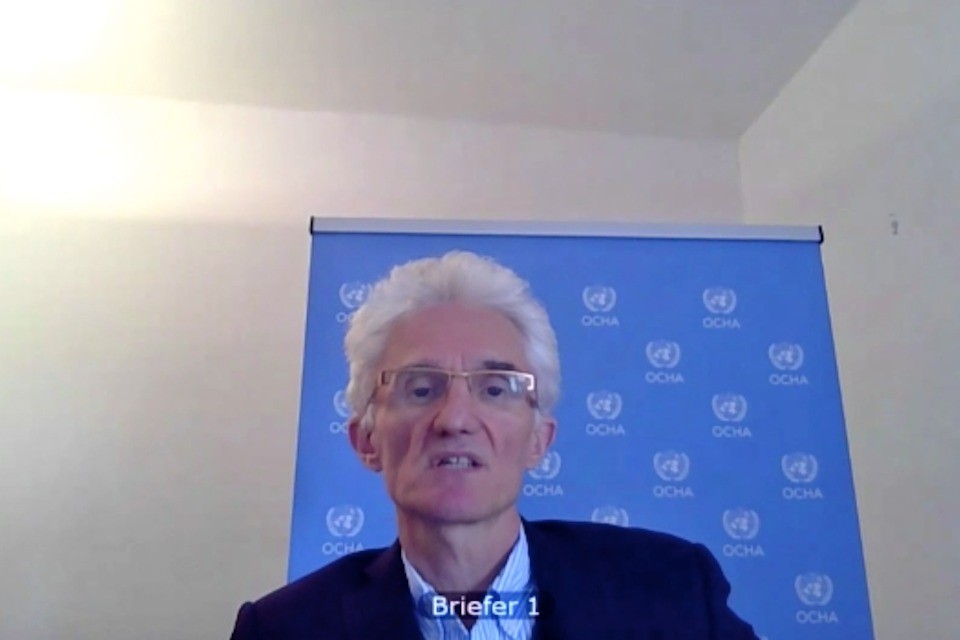Ensuring aid reaches north-east Syria
Statement by Ambassador Jonathan Allen, UK Chargé d’Affaires to the UN, at the Security Council meeting on Syria (humanitarian)

Thank you very much, Mr President. Let me also, of course, thank Mark Lowcock for his briefing and Susannah Sirkin from Physicians for Human Rights for what she had to say as well, which was very powerful.
Mr President, the United Kingdom remains committed to ensuring that aid in Syria reaches those who need it, regardless of location. In light of that, we continue to believe that it is necessary to renew the cross-border mandate in the north-west and to re-authorise the mandate for the north-east. And we strongly support the efforts of our humanitarian co-penholders to enact it. A mandate renewal for twelve months in the north-west is the minimum required to enable aid agencies to function effectively in the region. And re-authorisation in the north-east at Yaroubiya represents the most effective way of getting aid to an incredibly vulnerable population.
Mr President, I agree with all of those who’ve said humanitarian aid should not be a political issue and nor should the modalities in the mechanisms.
Mr President, in the north-west, cross-border operations remain at their highest level since the mandate was approved in 2014, and both crossings remain vital.
In May 2020, 3.4 million people benefited from UN food, security and livelihood assistance, which directly came through Bab al-Hawa. One million people benefited from health assistance provided by cross-border aid through Bab al-Salaam. There have been no cross-line deliveries. There would be no reasonable justification for shutting off this vital lifeline for the millions in the region. In the north-east, over 1.4 million people living outside regime control continue to require humanitarian assistance. Cross-line remains an inadequate replacement for the cross-border mandate, and this is stated clearly in the Secretary-General’s June report. While we welcome the two World Health Organisation consignments delivering aid cross-line in May, there are 32 medicines that, as of the start of June, were a month away from running out at medical facilities in the north-east because the cross-border mandate was taken away.
Our Russian colleague raised the humanitarian principles. I just like to put on record our deep concern over the actions of the Syrian authorities in areas under their control and on cross-line in connection with the humanitarian principles. Colleagues, when cross-line deliveries fully compensate for the loss of cross-border, we’ll be happy to say it’s not needed in north-east. But until then, we have a responsibility to re-authorise cross-border into that region.
Now, Mr President, tomorrow, alongside many other Members of the Council, we’ll make a pledge at the EU-UN Brussels IV conference. The United Kingdom will continue to show its leadership on the humanitarian fault with its pledge. And we encourage others to donate generously, too.
My Russian colleague spoke of hypocrisy over humanitarian aid. All I can suggest is that all members of the Security Council look carefully tomorrow at which countries pledge and consider how much assistance has been given by different countries over the long years of the war, and then they can make their own minds up about hypocrisy.
Colleagues, we must all make sure that aid gets to those who need it most. However, we must once again emphasise that there will be no automatic transfer of our aid provision to the response led from Damascus if the renewal of the vital cross-border resolution is blocked.
Mr President, let me conclude by noting, as Mark Lowcock did, that Russia has just pulled out of the humanitarian de-confliction mechanism. This, of course, is the mechanism which is meant to protect hospitals and health workers. I say “is meant to” because the Board of Inquiry found it highly likely that Russia and the regime bombed two hospitals and a school. As so often, Russian Federation attacks any impartial report it disagrees with. But this new action, pulling out of the mechanism, I’m afraid only increases the chances of this happening again and more innocent lives being lost. We see absolutely no justification for this move. And so we strongly urge Russia to reconsider its decision and to put Syrian lives first.
Thank you very much, Mr President.